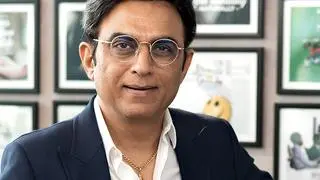Patanjali Ayurved-backed edible oil major Ruchi Soya will launch a ₹4,300-crore follow on public offer (FPO) on March 24. Yoga guru-turned-businessman Baba Ramdev, who also runs Patanjali Ayurved, shared his vision of making India self-reliant in edible oils by bringing down the country’s imports to zero over the next 10 years. He also spoke about bringing Patanjali Group’s revenue to HUL’s level soon. Edited excerpts.
Is this the right time to come out with an offer considering that the market is very volatile?
There is no one in the market (with an offer) and people are afraid and this is the biggest opportunity for us. And since there is no one, everyone wants to invest in us. This is an opportunity during distress.
Edible oil prices are at their peak. What is your reaction to this?
Nobody can escape situations. Covid-19 pandemic, Russia-Ukraine war, a crisis in edible oil crops, have taken a toll on the prices. The past two years have been the worst in recent times especially for edible oils.
How will you use the proceeds of the FPO?
Of the ₹4,300-crore FPO, we will use ₹3,300 crore to pay off the company’s debt. The entire term loan will be retired. There will be smaller debt on the books used for working capital.
India imports 65 per cent of edible oils. What is your vision on this?
It will take 5-10 years for India to cut down imports from Malaysia and Indonesia. We can make India ‘Atmanirbhar’ in edible oils. Edible oil imports are at ₹1.5-lakh crore and it can touch ₹2-lakh crore if we don’t do anything. Ruchi Soya will play a big role in cutting down India’s edible oil imports.
Where in India will you have these plantations?
These are in the North East, Andhra Pradesh, Telangana and some other places in the south. This will be done by Ruchi Soya. There are four areas of Ruchi Soya where Patanjali will not work anymore. These are edible oil, nutraceutical, palm plantation and food. We will transfer the food portfolio to Ruchi Soya. Medicine and personal care will remain under Patanjali.
What work are you doing in edible oils?
There are different types of edible oils in the market – groundnut, sunflower, mustard, soya – all these will keep their importance in the future. Ultimately, people will switch to virgin oils. We will work a lot on virgin oils, the ones which do not require chemical processing. They are considered to be the best and healthy.
What kind of investment are you targeting in the coming years?
We have 23 plants and they are working at full capacity. The Patanjali plants will be transferred to Ruchi Soya. We don’t need to invest in expanding the capacity. We would invest in exports, distribution, and brand.
Analysts believe that there cannot be a direct comparison between Ruchi Soya and HUL because Ruchi Soya sells low margins products whereas HUL has comparatively higher-margin products. Your comments.
Ruchi Soya and Patanjali will be bigger than (Hindustan) Unilever in a few years. We have a big vision for the group. At the group level we will beat HUL very soon in revenues and also at the EBITDA level through products for ‘mass and class’ segments. After we declare the March quarter results, we will be close to HUL and even go ahead later.
Are there any white segments for the group to enter?
The portfolio we have is large enough. Virgin oils are a big segment. MNCs have veered towards unhealthy food and created addiction. We will create a healthy food addiction.







Comments
Comments have to be in English, and in full sentences. They cannot be abusive or personal. Please abide by our community guidelines for posting your comments.
We have migrated to a new commenting platform. If you are already a registered user of TheHindu Businessline and logged in, you may continue to engage with our articles. If you do not have an account please register and login to post comments. Users can access their older comments by logging into their accounts on Vuukle.